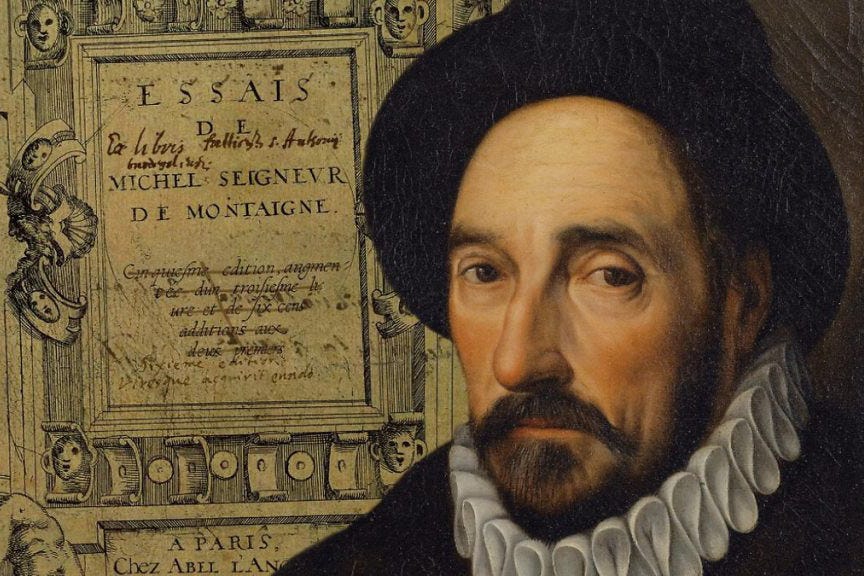Substack has provided great opportunity for the essay as a genre to be rediscovered.1 Many essayists at Substack provide the 21st century reader with voices for instruction and scolding. The essays of Michel Eyquem de Montaigne (1533 – 1592)—who is known mainly as “Montaigne” — are the foundation of the essay form as found at Substack’s pages today.2
In Montaigne’s essays"there is a voice for instructing, a voice for flattering, a voice for scolding. I want my voice not only to reach my listener, but perhaps to strike and pierce him"3
How did Montaigne gather so many thoughts and develop his essays? What was the font of his fabulous imagination?4
Montaigne's Library
Montaigne had a magnificent library and it was his throne.
At home I betake me somwhat the oftner to my Librarie, whence all at once I command and survay all my houshold … There is my seate, that is my throne."
Montaigne, Essais III.3, ‘Of three kinds of relationships’, trans. Florio
A major international project MONtaigne at Work has reconstructed Montaigne’s Library and you can tour it.5
Montaigne’s library was located in a circular tower at the Château de Montaigne, near Bergerac and Saint-Emilion. You can take a virtual tour of a reconstruction of the library — in the sense of a room — at the Musée d’Aquitaine’s website. Click on it and you can drag the cursor around to rotate the display.6
Edward Abbey was deeply influenced by Montaigne.7
Substack essayists, do you keep your library safe?
For example, the Substacks of Matt Taibbi, TKNews ; Freddie deBoer, fdb Freddie deBoer; Angela Nagel, Angela Nagel; Glenn Greenwald, Glenn Greenwald; Anne Helen Petersen, Culture Study.
Read Hall about the development of “The Essay” as a literary form. Hall, Michael. "The Emergence of the Essay and the Idea of Discovery." Essays on the Essay: Redefining the Genre. Ed. Alexander Butrym. Athens: U of Georgia P. 1989. 73-91; Hartle, Ann. "The Essay as Self-Knowledge: Montaigne s Philosophical Appropriation of History and Poetry." Philosophy and Culture (Nov. 2002): 63-83.
Montaigne, Michel. The Complete Essays of Montaigne. Trans. Donald M. Frame. Stanford: Stanford UP, 1958, p. 834.
Kritzman, Lawrence D. The Fabulous Imagination: On Montaigne's Essays. New York: Columbia University Press, 2009.
“MONtaigne at Work” (MONLOE)" is a project to bring together the main elements of Montaigne’s output:
the major editions of the Essays
the “archaeological” edition of the so-called “Bordeaux” copy (1588, with corrections and additions almost all autographs)
Raymond Sebond's translation
the edition of La Boétie by Montaigne
all the works bearing Montaigne's signature kept in the various public and private libraries, some annotated by La Boétie and others by Montaigne (ed. A. Legros)
documents relating to Montaigne (ed. A. Legros) a new edition of the inscriptions of his “library” (ed. A. Legros)
To this will be added a selection of works which can be considered to constitute major sources for the Essays.
The “Gilbert de Botton” bequest is kept at the Library of the University of Cambridge.
MONLOE emphasizes what can be discovered of the creative dimension of a work from a digitized corpus: development process, additions and corrections, modification of source texts and compilations, interventions of author, invention of the “essay” and manifestation of the most significant concepts of the Essays (“human condition”, doubt, prudence, inscience, good faith, “fantasy.”
Hollick, Richard. Montaigne’s Library, Making Book. January 21, 2022.
Ryan, Michael C. "The art of paradox and contradiction in 'Free Speech: The Cowboy and His Cow': Edward Abbey, Michel Montaigne, and the essay." Southwestern American Literature, 30, spring 2005, pp. 9+.






I bought a new edition of Montaigne's complete works. It is 1300 pages and I think it is in 8pt. type. That's a lot of words by quill. I might go for an abridged ed. it includes his letters. I wonder if he is the best documented person ever?
Montaigne lived during a time of tribal fracturing and hatred similar to our own (his time was much more violent but much less stupid) and was able to keep his head (literally and figuratively) through his wide and varied reading, his even-keeled soul and naturally kind temperament, his congenital allergy to any and all certitude, and most importantly, by NOT TAKING HIMSELF SERIOUSLY:
"Souls are most beautiful when they show most variety and flexibility....If I ever want to laugh at a fool I do not have to look far: I can laugh at myself." etc etc...
I've always thought that if I ever end up in prison, as long as they let me keep a copy of his Essays, I'd be ok (minus the violence, of course)...;)
Thanks for this, Kathleen!